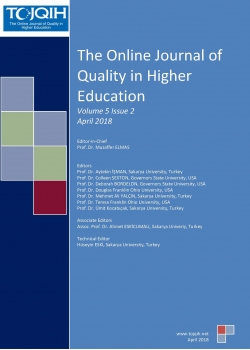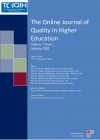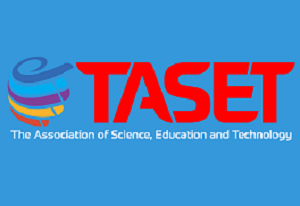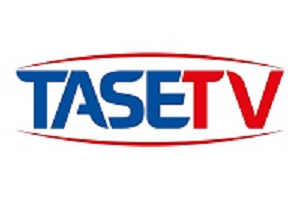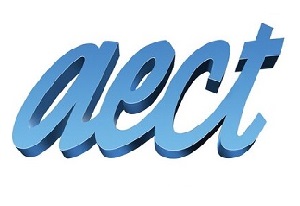TOJQIH - Volume 5 - Issue 2 - April 2018
 A GLOBAL FALSE DICHOTOMY IN HIGHER EDUCATION: TEACHING VS. RESEARCH
A GLOBAL FALSE DICHOTOMY IN HIGHER EDUCATION: TEACHING VS. RESEARCH Ali Baykal
Abstract:
There are so many false dichotomies (e.g. nature vs. nurture, theory vs. practice, general vs. vocational, teacher
vs. technology) in educational assertions especially in higher education. Forced choice between these
dichotomies definitely mystify the option in favor and tend to obscure the other. The purpose this study is to
display an empirical evidence for the inseparable nature of research and teaching in higher education. Neither of
them can be excelled at the expense of expelling the other. In order to fulfil this purpose Times Higher Education
(THE) World University Rankings 2016-17. Pearson product moment correlation was found to be significantly
high and positive. In fact the correlation between Teaching and Research is always the highest one among all the
other paired criteria in every different context. This finding is not sufficient but necessary evidence to assert that
Teaching and Research do not alternate but reinforce each other in higher education.
 A PERFORMANCE STUDY FOR THE UNIVERSITIES FOUNDED BEFORE 1973, TURKEY
A PERFORMANCE STUDY FOR THE UNIVERSITIES FOUNDED BEFORE 1973, TURKEY Hasan TOSUN
Abstract:
In Turkey the nine universities were established up-to 1973 after the first contemporary university of country,
namely Daru’l Fünun was diminished in 1933. The performance of these higher education organizations, which
are classified as “A-Categorized University” in some documents, was evaluated by the Ranking System on
Academic Performance which was developed for the country’s special conditions as based on different criteria.
This paper mentions the main principles of this performance system and summarizes the study which was made
for the performance of selected universities throughout country. This study includes the nine universities
(Ankara, Atatürk, BoÄźaziçi, Ege, Hacettepe, Ä°stanbul, Ä°stanbul Teknik, Karadeniz Teknik ve Orta DoÄźu Teknik),
which were founded between 1933 and 1972. In this study, data belonging to the period of 2010 and 2014 have
been considered for the related universities. The system depends on education income, education structure,
education quality, number of publications and projects, the index for Entrepreneurial and Innovative University
and student satisfaction. The aim is to provide a comparative study on academic performance with well-balanced
and justice decision for the related universities. This study indicates that there are so many parameters acting on
the performance of universities, however the enlargement rate, localization and degradation on management
system are dominant.
 ATHLETE SATISFACTION SPORT ADMINISTRATION : A PENANCEA FOR ACHIEVING EFFECTIVENESS IN NIGERIAN UNIVERSITIES GAMES
ATHLETE SATISFACTION SPORT ADMINISTRATION : A PENANCEA FOR ACHIEVING EFFECTIVENESS IN NIGERIAN UNIVERSITIES GAMES Michael Ogundele
Abstract:
The study is on the relationship between student athlete satisfaction and sports organization effectiveness in
Nigeria universities, sports in the universities is essentially for the students and by the students. This means that,
the student is the prime beneficiary and also the producer of sports as entertainment in the university. But each
time the issue of effectiveness in university sports organization is addressed, consideration is only centered on
the programmes, facilities, leadership, coaches and coaching etc. Nothing is mentioned about the student athlete
experiences. This deliberate ignorance of the student-athlete's experience leads to the need for this study, to
examine the student-athlete satisfaction. To do this, the research design employed for the study was the ex-postfactor
research design, which is based on information in existence and cannot be manipulated. The researcher
utilize questionnaire as the tool for obtaining the data for the study. The questionnaire constitute of four parts A,
B, and C put together as one and was administered to students' athletes from fourteen (14) universities randomly
selected from seven (7) stratified Nigerian Universities Games Association (NUGA) zones. Five most popular
sports (Football, basketball, athletic, racket game and combat sport) were used, and ten (10) athletes from the
above mentioned most popular sports = 10x5 = 50 athletes from each university, = 14x50 = 700 the total number
of respondents. The data collected were statistically analyzed, using descriptive, multiple and zero order
correlation. The major findings Student-athlete satisfaction is highly related to sports organizational
effectiveness. Both facets of outcome and processes affects the student athlete satisfaction in the sports
organization. The major findings are Students-athlete satisfactions are highly related to sports organizational
effectiveness, both facets of outcome and process affects the student satisfaction in the sports organization,
individual satisfaction in sports organizations of Nigerian universities and its needs for continued assessment are
inseparable in Nigerian university, coaches and sports administrators needed cannot produce the entertainment
from sports organizations. Students-athlete satisfactions and its needs for continued assessment are inseparable
in Nigerian university sorts organization.
 CONSIDERING SOCIAL MEDIA AS A VIRTUAL “PANOPTICON”: MEDIA LITERACY IN HIGHER EDUCATION
CONSIDERING SOCIAL MEDIA AS A VIRTUAL “PANOPTICON”: MEDIA LITERACY IN HIGHER EDUCATION Vahide Melis Yalçın
Abstract:
The Panopticon (the Greek word for all-seeing) is a circular prison design made by English philosopher Jeremy
Bentham in 1785. The concept enables a single guard to observe a large number of prisoners from her/his tower
surrounded by the cells. The prisoners cannot see the tower, because it shines bright light. Therefore, they
convince themselves that they are being watched continuously in their cells, and begin to control their own
behaviours. In his 1975 book “Discipline and Punish: The Birth of the Prison”, Michel Foucault uses the term
panopticon as a metaphor for modern surveillance. The panoptic style of architecture has been used not only in
prisons, but also in other modern institutions such as schools and hospitals. The rapid development of digital
technologies in the last decades has paved the way for social media to be one of the most effective
communication tools, and eventually a virtual panopticon. Thus, media literacy education has become an
important agenda for any society to reduce the risks of social media. The aim of this study is to explore the
relationship between social media and surveillance, and emphasize the necessity of media literacy education in
higher education.
 COPING WITH QUALITY ISSUES IN MANAGEMENT INFORMATION SYSTEMS’ DEPARTMENTS IN TURKEY THROUGH ACCREDITATION
COPING WITH QUALITY ISSUES IN MANAGEMENT INFORMATION SYSTEMS’ DEPARTMENTS IN TURKEY THROUGH ACCREDITATION Erman Coşkun, Büşra Alma
Abstract:
Presently, there are 70 departments associated with MIS discipline, which has emerged in a short span of time.
Since, it is hard to claim that MIS departments and discipline have reached certain maturity level in Turkey. MIS,
by combining various disciplines is an interdisciplinary field of study that necessitates professional skills within
a global and societal context. Consequently, in order to rise high-skilled graduates each MIS department applies
its own practices in terms of curriculum, program outcomes, program educational objectives, students’ monitoring
and support which leads to inconsistencies and concerns associated with the global recognition of MIS
departments in Turkey. Thus, the accreditation and evaluation of MIS departments is essential so as to achieve
high levels of quality and provide harmony among different departments. Therefore, our goal will be comparing
two accreditation bodies’ requirements (AACSB and ABET) and find out which one is more suitable for MIS
departments and how they can contribute to increase quality of education in MISdiscipline.
 DETERMINING THE MANAGEMENT INFORMATION SYSTEMS STUDENTS’ LEARNER CHARACTERISTICS: SOCIAL SHY OR IDEA ORIGINATOR
DETERMINING THE MANAGEMENT INFORMATION SYSTEMS STUDENTS’ LEARNER CHARACTERISTICS: SOCIAL SHY OR IDEA ORIGINATOR Tuğba Koç, Birgit Oberer, Alptekin Erkollar
Abstract:
The rapid growth in the use of information and communication technologies and their smart applications in the
field of education have offered new ways to educators to create more flexible and suitable learning
environments. Nowadays, e-learning systems are expected to support better learner-centric instruction and enable
more self-directed learning. Today’s Learning Management Systems (LMS) use several methods for selecting
suitable learning objects. The main difficulty with this process is the content and size of learning objects. Based
on several criteria rules can be derived. One main rule composing an integrated and smart learning environment
is to decide on learners’ characteristics. In this study, different learning styles are discussed, and selected learning
styles inventories (LSI) analyzed. LSI assesses a person’s learning style, helping them identify the strategies they
most and least prefer to adopt when learning new material. The most popular learning style inventories - Kolb's
Learning Style Inventory and Felder-Silverman’s Index of Learning Survey is then applied for evaluating the
learning approaches of Management Information Systems (MIS) students at the Bachelor's Degree Level, who
have mainly both business and technical skills. It is one aim of the study to find out if students who have nearly
same scores from a University entrance exam have same learning styles; and which learning styles most
successful students have. Depending on the results of the field study there should be developed strategies for
developing more effective learning environments to be able to consider students' learning approaches when
developing or improving learning environments.
 INVESTIGATING THE UTILIZATION OF INTERACTIVE BOARD AND ITS APPLICATION IN TEACHING CHRISTIAN RELIGION KNOWLEDGE IN COLLEGES OF EDUCATION IN NORTH CENTRAL
INVESTIGATING THE UTILIZATION OF INTERACTIVE BOARD AND ITS APPLICATION IN TEACHING CHRISTIAN RELIGION KNOWLEDGE IN COLLEGES OF EDUCATION IN NORTH CENTRAL Ajayi Daniel Oluwafeyikemi, Dorcas Tabitha Wusa Ajayi, Abalas Daniel Gata
Abstract:
The paper investigated the utilization of interactive board and its application in teaching Christian Religion
Knowledge in Colleges of Education in North central. Specifically the study is designed to find out the extent the
teachers utilize interactive board in teaching Christian Religion Knowledge. The researchers adopted a
descriptive survey design in which questionnaires were used to collect information from the respondents. The
population consisted of 45 teachers of Christian Religious Knowledge in Colleges of education in North central
zone. The sample for the study consists of 25 teachers of Christian Religious Knowledge in Colleges of
education in North central randomly selected. The 25 teachers are made up of 15 males and 10 females. Data
were obtained using a researchers structured questionnaire. The instrument was validated by three experts in
Science and Technology Department of the rank of Professors from University of Jos, with reliability index of
0.67. The method used for data analysis was mean scores for the research questions and t- test analysis for the
hypothesis. Results obtained showed that though interactive board is germane to effective teaching of CRK but
only few of the interactive boards are found in the colleges of education, even the few that are found in the
schools are hardly utilize for teaching by the lecturers. It was recommended among other things that Lecturers
should always adopt the use of interactive board in the teaching of CRK for it has the potential of making
teaching effective and enhancing learning.

